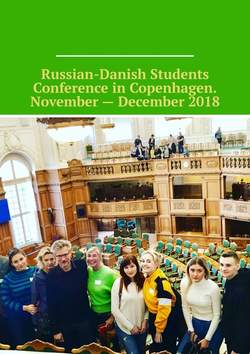Читать книгу Russian-Danish Students Conference in Copenhagen. November – December 2018 - Bjørnø Irina - Страница 3
На сайте Литреса книга снята с продажи.
Introduction
ОглавлениеAt the present stage, Russian-Danish interaction is characterized by a wide range of areas of cooperation, including high-level contacts, trade, economic and humanitarian ties.
Despite the fact that the relations between Russia and Denmark were not good-neighborly in all historical periods, at present both sides are making all possible efforts to establish strong relations, developing joint projects in various fields.
This collection of articles is based on the results of student scientific conferences held under the auspices of the Russian Cultural Mission in Denmark and the Russian Center for Science and Culture.
The first part of the collection is called “Social, political and economic trends in modern Europe on the example of Denmark”. The issues covered in this section are devoted to the consequences of migration and the aspects of socio-religious character related to this, current socio-economic trends in the development of the Danish society, as well as issues of self-determination of such parts of Denmark as the Faroe Islands and Greenland. The focus of this section is on a general analysis of the main spheres of society in Denmark with a view to a deeper understanding of the causes of success and/or failures of the Scandinavian model of government.
The second part of the collection is titled “Theory and practice of implementing political, economic, and social projects as an opportunity for solving problems in a society: Denmark, from an individual consumption society to a society of social justice and responsibility”. Within this part, the specific reasons for the success of the state model of Denmark, as well as some of its shortcomings, are considered in more detail. The students analyzed exactly how Denmark managed to move on to a model of the structure of society, in which such concepts as social responsibility and justice set the tone for the functioning of the entire state. As it turned out, the success of the Danish state system lies in almost pedantic attention to everything: from the formation of environmental literacy and the search for the most effective ways of recycling household waste to cultivating a negative attitude of society to such a phenomenon as corruption and social indifference. However, even in such a progressive society there are own drawbacks.
As was mentioned above, it is equally important for Russia and Denmark to strive to develop joint projects in the political, social and economic sphere in order to solve common problems in their societies in both the short and long term. If the model of the public-state system of Denmark has already managed to show itself as successful, Russia in this regard should pay more attention to the positive experience of its Western colleagues.
The students of the Institute of World Civilizations, who took part in a series of these conferences, gained invaluable experience not only in the analysis and writing of articles of a scientific nature, but also expanded their professional and personal horizons, immersing themselves in the culture, history and traditions of Denmark.
